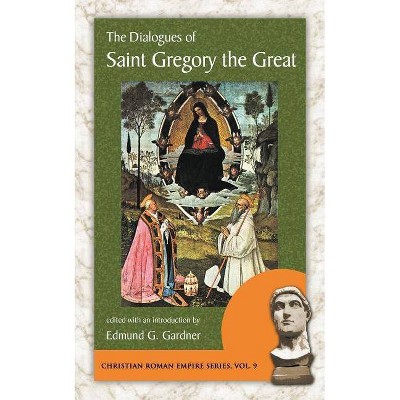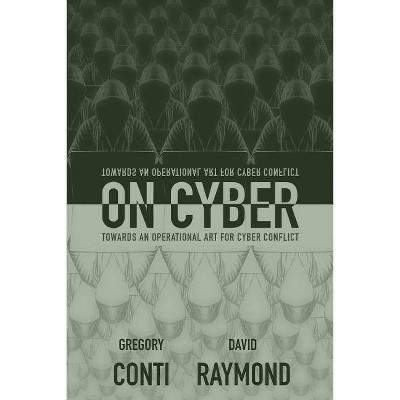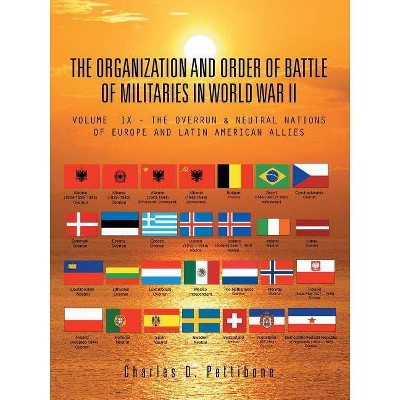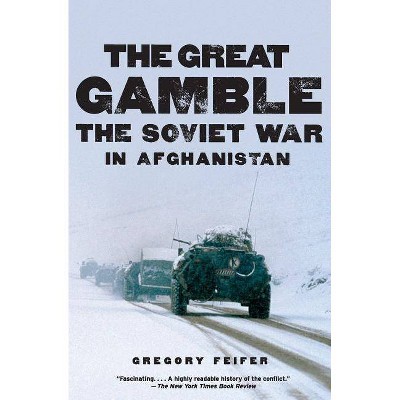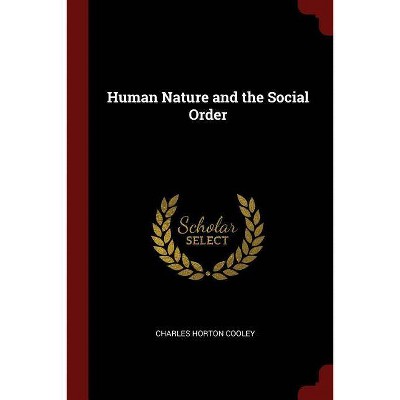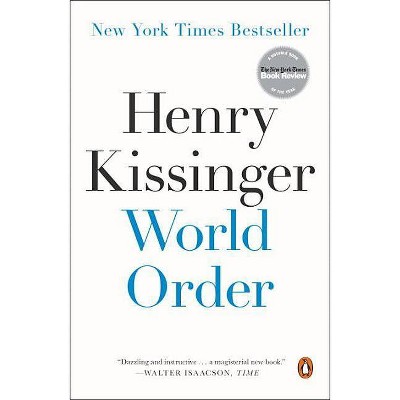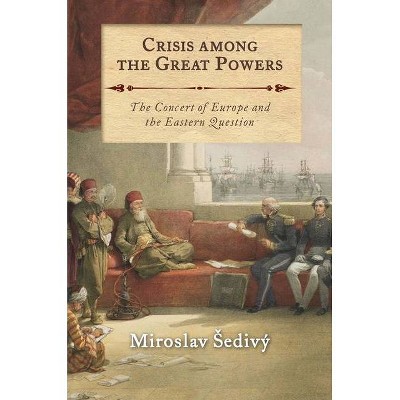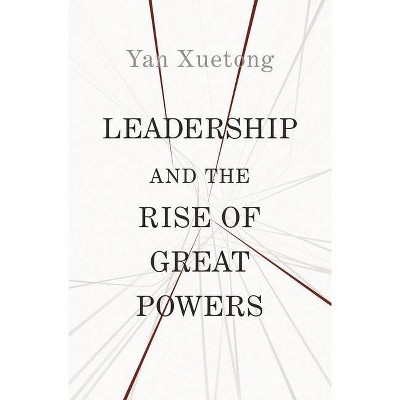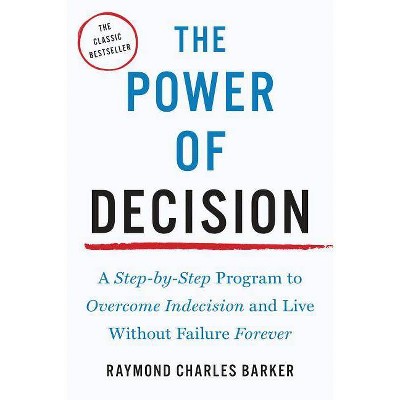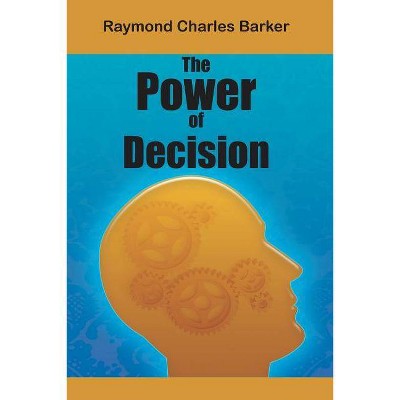Great Powers and World Order - by Charles W Kegley & Gregory A Raymond (Paperback)
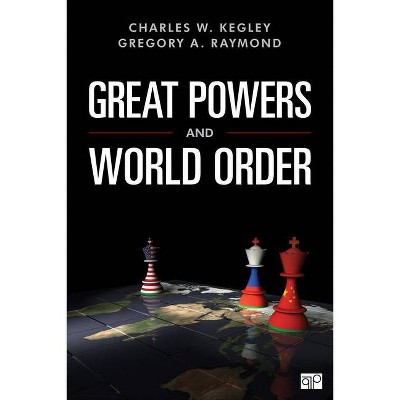
Similar Products
Products of same category from the store
AllProduct info
<p/><br></br><p><b> About the Book </b></p></br></br><strong><em>Great Powers and World Order</em></strong> encourages critical thinking about the nature of world order by presenting the historical information and theoretical concepts needed to make projections about the global future. Charles W. Kegley and Gregory Raymond ask students to compare retrospective cases and formulate their own hypotheses about not only the causes of war, but also the consequences of peace settlements. Historical case studies open a window to see what strategies for constructing world order were tried before, why one course of action was chosen over another, and how things turned out. By moving back and forth in each case study between history and theory, rather than treating them as separate topics, the authors hope to situate the assumptions, causal claims, and policy prescriptions of different schools of thought within the temporal domains in which they took root, giving the reader a better sense of why policy makers embraced a particular view of world order instead of an alternative vision.<br/> <br/> <br/><p/><br></br><p><b> Book Synopsis </b></p></br></br><strong><em>Great Powers and World Order</em></strong> encourages critical thinking about the nature of world order by presenting the historical information and theoretical concepts needed to make projections about the global future. Charles W. Kegley and Gregory Raymond ask students to compare retrospective cases and formulate their own hypotheses about not only the causes of war, but also the consequences of peace settlements. Historical case studies open a window to see what strategies for constructing world order were tried before, why one course of action was chosen over another, and how things turned out. By moving back and forth in each case study between history and theory, rather than treating them as separate topics, the authors hope to situate the assumptions, causal claims, and policy prescriptions of different schools of thought within the temporal domains in which they took root, giving the reader a better sense of why policy makers embraced a particular view of world order instead of an alternative vision.<br/> <br/> <br/><p/><br></br><p><b> Review Quotes </b></p></br></br><br><em>The Great Powers and World Order </em>provides an authoritative account of the nor- mative underpinnings of international security. The rules of the road founded on the liberal world order are now under attack, and normative and institu- tional restraints are crumbling. This book presents a cogent and instructive interpretation of the prevailing problems darkening contemporary international realities.<br/>--Joel Rosenthal<br><br>[Great Powers and World Order] provides a clear chronological history of the events that led to contemporary opportunities and challenges for the world. A comprehensive text that provides students conceptual tools to make sense of the genesis and the shaping of the current global order. <br/> <br/>--Benn L. Bongang<br><br>[The text's] writing style makes it accessible to students, and that indicates a great potential for the book to engage students and encourage them to actually read it. The authors focus on the essential knowledge and there was no fluff material that can overwhelm students. I really like the section where it presents the notion that international relations really hinges on two things - maintaining international norms and preventing aggression. Such an important understanding and presented really clearly and succinctly.<br/> <br/> <br/>--Kyeonghi Baek<br><br>A penetrating and timely analysis of the collision course on which the great powers are heading, which uncovers the basic tenets of international relations in the context of the eroding world order.<br/>--Alpo Rusi<br><br>A reader for students so they have pertinent information at their fingertips regarding the conflicts that have forged our world.<br/>--Richard Arnold<br><br>Case studies of great-power rivalries since the twentieth century are deployed to exceptional pedagogical advantage to instruct students about enduring questions in today's turbulent times. The innovative format forces students to think for themselves. This textbook is highly recommended for university courses focusing on this troubling topic on the contemporary global agenda.<br/>--Shannon Lindsey Blanton<br><br>Citizens, and particularly future military officers, cannot begin to think about and study big questions and strategic issues too early. <em>The Great Powers and World Order </em>is an excellent introduction to these questions and issues and should be required reading for both civilian students and military officers in training.<br/>--Dan Caldwell<br><br>Combining history and theory, Kegley and Raymond have composed a clear and insightful primer for understanding great-power politics and interna- tional relations, past and present. Their lucid descriptions of the challenges faced by officials after World War I, World War II, and the Cold War are seamlessly linked to an illumination of the policy choices that lay ahead. This is a terrific text for beginning students studying international relations. <br/>--Melvyn Leffler<br><br>For an insightful interpretation of the threats to world order fomented by the great powers' return to cut-throat competition and rejection of multilateral cooperation, this evocative, compelling and accessible text provides pedagogical medicine. Highly recommended for all global citizens investigating inter- national politics.<br/>--Roger A. Coate<br><br>Great Powers and World Order is a timely re-introduction to power politics in the international system. In an era when great power conflict of one type or another seems an ever-present threat, this text will help students to understand the origins and such conflicts, and ground their knowledge through thorough case-studies. <br/> <br/> Consistent analytical approach. Easy for students to grasp. <br/>--Geoff Allen<br><br>In this important book, Kegley and Raymond reexamine the pillars of world order at a turbulent time when global conditions are nearing a turn- ing point of potentially epic proportions. The <em>Great Powers and World Order </em>brings historical perspective and theoretical analysis to bear on the impact of momentous changes--for example, climate change, cyberwarfare, the weap- onization of outer space, and, critically, a global arena that is no longer dom- inated by Western liberal values. <br/>--William Bain<br><br>Informed and informative, <em>The Great Powers and World Order </em>provides an engaging introduction to international politics. This is the best available text addressing what is arguably the most important set of issues on the global agenda.<br/>--M. Leann Brown<br><br>It′s a good, solid introduction to the study of IR on the college level. It provides all the necessary basic information students need to begin their IR study, and to allow them to concentrate their future studies in areas of greatest interest to them. It is a good springboard into a lot of different directions.<br/>--Charles M. Swinford<br><br>Prolific scholars and creative educators, Kegley and Raymond have published many innovative textbooks with original pedagogical features about American foreign policy and world affairs. <em>The Great Powers and World Order </em>goes beyond provoking students to think for themselves about the important questions regarding contemporary threats to sustainable international security. It also advances important concepts that reframe theories about great-power relations in particular, and international politics generally.<br/>--Llewellyn D. Howell<br><br>The fragile foundations of our liberal world order that is based on rules and institutions are being shaken by the great powers' rivalries. This book is must reading for all serious students of contemporary world affairs.--Olli Rehn<br><br>The global political transformation underway will impact everyone. Study this compelling text to understand the form and consequences of past power rivalries and the critical choices before us now.<br/>--Charles F. Hermann<br><br>This book highlights the complexities within the international arena, and forces students to critically think by putting them in the You Decide driver's seat. <br/>--Nicholas P. Giordano<br><br>This book illuminates the timeless obstacles to world order whenever the great powers ruthlessly compete for hegemony, as they presently are doing as they head into perilous confrontations. Highly recommended reading for all policymakers and students of world affairs.<br/>--Pierre Gehlen<br><br>This historically grounded textbook will introduce students to the difficulty of establishing a stable world order. [An] historical based book that presents how realism and liberalism inform how world orders are constructed.<br/> <br/>--Charles J. Fagan<br><br>This is an outstanding book, covering critically important global issues which makes a significant and original contribution to the storehouse of available textbooks dealing with contemporary world affairs.<br/>--Ole R. Holsti<br><br>This new textbook by Charles W. Kegley, Jr. and Gregory Raymond brings an innovative approach to the teaching of International Relations, by interweaving historical facts with the theoretical concepts needed for their interpretations. This book can be an excellent supplemental book for undergraduate students, and a great introductory book for graduate students. As the authors stated, it can solve the problem of thinking critically and theoretically about the world order, by interweaving the presentation of 'historical information and theoretical concepts needed to investigate its features.' <br/>--Adrien M. Ratsimbaharison<br>
Price History
Cheapest price in the interval: 45 on October 27, 2021
Most expensive price in the interval: 45 on November 6, 2021
Price Archive shows prices from various stores, lets you see history and find the cheapest. There is no actual sale on the website. For all support, inquiry and suggestion messages communication@pricearchive.us
